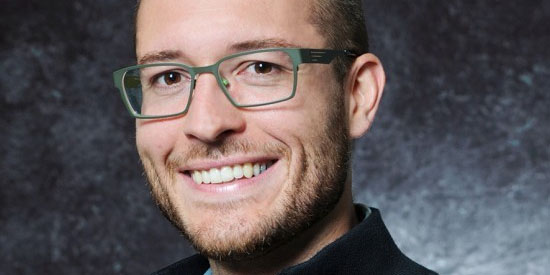2017 Was a Good Year for Nathan Gabor

In 2017 Nathan Gabor, a condensed matter physicist at the University of California, Riverside, had the unique experience of being named both a Cottrell Scholar and a CIFAR Azrieli Global Scholar.
Research Corporation for Science Advancement’s (RCSA) Cottrell Scholar program develops outstanding teacher-scholars who are recognized by their scientific communities for the quality and innovation of their research and teaching programs and for their academic leadership skills. The CIFAR Azrieli Global Scholars program, inaugurated in 2017, funds and supports researchers within five years of their first academic appointment, helping them build research networks and develop leadership skills.
“The two organizations are remarkably complementary,” Gabor said. “Both bring together incredible people with the purpose of generating new and exciting ideas. The meetings of both organizations have very different styles, and different ways of engaging the participants. However, the results are the same. People are brought together ... to do cutting-edge science, and I sense that these bonds are very fruitful and long-lived.”
Topping off his funding annus mirabilis,Gabor also received a 2017 National Science Foundation CAREER Award, bringing his total support in 2017 to $700,000.
While the Cottrell Scholar program and the NSF CAREER Award are fairly well known to U.S. academic scientists, the CIFAR (Canadian Institute for Advanced Research) Azrieli Global Scholars program is less so. The program was created when the Azrieli Foundation donated $10 million to CIFAR, half of which goes to support Global Scholars, while the other half supports the Azrieli Program in Brain, Mind & Consciousness.
Gabor said he heard about the Global Scholars program through RCSA and through a UCR colleague who received an email from CIFAR.
The CIFAR selection process is “very rigorous,” Gabor said, noting that 32 finalists were selected from more than 500 applicants. “The first screening was designed to find compatibility between the candidate and one of several major programs at CIFAR, for example, the Bio-Inspired Energy program. Thirty-two of us were then invited to a two-and-a-half-day meeting in which we were evaluated on leadership skills, communication, thinking on our feet, and many other skills not related to our research. In the two days that I visited Toronto, I spoke about my research for only five minutes during a lightning talk in a sub-group of about eight of us.”
He recalled that most of his time was spent being evaluated on various interactions with the other candidates, “all of whom were excellent in their respective fields,” ranging from social science to the physical and natural sciences. The majority of the time was actually spent in a think-tank style meeting with five other candidates and two evaluators.
“Within a small group, we were tasked with generating the next program at CIFAR, basically inventing the next big research direction that would encompass science, ethics, policy, law, everything.” Gabor’s team generated the top-ranked concept, called “Informatic Human,” based on the team members’ discussions of the potential impacts of big data and bioinformatics on society, and their debates on the definition of “being human.”
He said program meetings are held two or three times a year. “Each year there is one meeting of the Global Scholars, young faculty like me who have been selected over the years. These meetings focus on developing leadership skills and interacting with people outside academia. Additionally we meet within our respective scientific programs one or two times a year in various places all over the world. These meetings are very technical in nature and combine the expertise of more than a dozen Fellows and Senior Fellows, who aim to map out the big research directions for the group. These meetings are several days long and the content is kept within the CIFAR organization.”
Gabor said he believes CIFAR does something very important: “It allows a forum for young faculty with big ideas to interact with the established 'giants' in the field in the hopes that well-established ideas can be challenged. In the literature, it’s very hard for a young scientist to propose an idea that contends with the current paradigm. CIFAR seems to want to break down that barrier by encouraging discussion between these different groups. In fact, at our recent meeting, CIFAR’s president quoted Max Planck, ‘Science advances one funeral at a time.’"
He notes the emphasis of CIFAR Global Scholars program differs from that of the Cottrell Scholar program, but together both programs emphasize what it takes to be an academic leader.
“CIFAR focuses on communicating and making connections to those outside of science – policy makers, industry leaders, politicians, CEOs -- but the main emphasis is on getting the science moving forward in big leaps. The Cottrell program also aims to move the science forward aggressively, and it places its emphasis on academic leadership and teaching as a means to generate positive change across widely varying colleges and universities,” he said. “These complementary, but equally important emphases are very critical to my development at this time in my career.”





